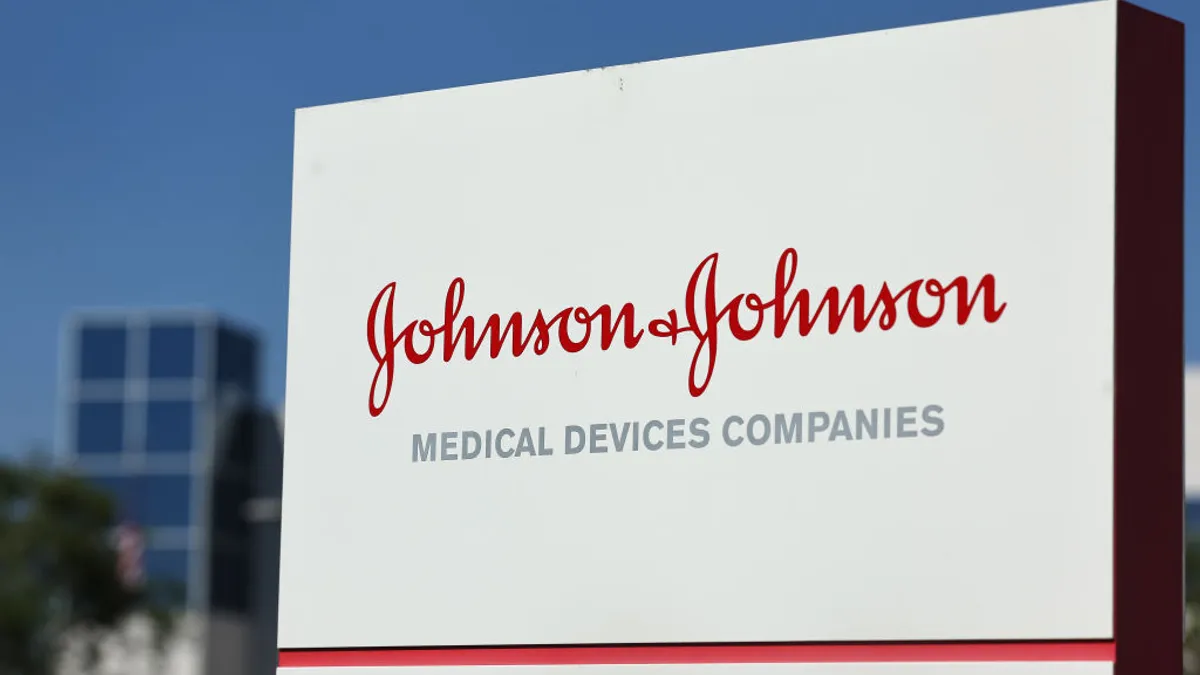Johnson & Johnson owes more than $1 billion in damages to investors of robotic surgery device maker Auris Health for breaching earnout provisions in its contract to acquire the startup in 2019 and for committing fraud by withholding information critical to one of the provisions, the Delaware Court of Chancery ruled Sept. 4.
“J&J’s promise to Auris was broken almost immediately after closing,” Lori Will, vice chancellor of the Chancery Court, said in her 144-page ruling.
J&J had been developing its own robotic surgery device and viewed its acquisition of the startup as a way to pursue a strategy of bringing complementary devices to market for different types of operations, what the company called a “bullet proof” way to guarantee its leadership in the next generation technology in the space.
To get the deal over the finish line, J&J offered the startup $3.4 billion upfront and another $2.35 billion in earnout incentives as regulatory and sales milestones were reached. It also promised to treat Auris’ devices as a priority, help it meet its regulatory milestones and make decisions without factoring in the earnout payments.
“J&J violated each obligation,” the ruling said.
Almost immediately after the deal closed, J&J threw the startup a curve ball by directing it to participate in a “bake-off” that pitted one of its robotic devices against the robotic device that J&J was developing. That was an early indication J&J wasn’t interested in pursuing the two-device strategy but was instead trying to see which device to keep and which one to get rid of.
“By this point, [J&J executives] had agreed that parallel pathing both robots would be an unsuccessful strategy,” the ruling said. “They believed that only one system should be brought to market.”
Auris’ device won the contest but at the cost of missing its first milestone and having to absorb the losing J&J engineers into their team, creating upheaval that led to resignations, further setting back project development.
Auris’ team, the ruling said, “went from nimble and focused to redundant and divided.”
J&J threw Auris another curve after the FDA, in a move that surprised both companies, said Auris had to pursue regulatory approval of one of its devices using a different pathway than the one the companies had planned. Notwithstanding the change, Auris said it could meet its milestone, but J&J said the action amounted to a “new reality” and used it as a pretext for writing down its earnout obligations.
“J&J then implemented an employee incentive plan with different targets,” the ruling said.
In its fraud finding, the court said J&J had been misleading by failing to tell Auris, before the merger was completed, that a J&J-made catheter that Auris was planning to use in one of its devices was under FDA investigation after the death of a test subject. By withholding that information while knowing it would delay Auris’ ability to reach one of its milestones, J&J met the threshold for fraud.
“J&J told Auris that this milestone was so certain to be met that J&J viewed the associated payment as up front consideration,” the ruling said. But J&J knew the patient death “put the milestone in doubt.”
Judge Will calculated just over $1 billion in damages against J&J based on the degree of probability that Auris would have met its milestones had there been no interference, plus interest.
“Earnout provisions are common risk allocation tools in merger agreements, particularly involving private company sellers,” the judge said. “A seller may be loath to agree to an earnout structure without contractual assurances from the buyer and a strong belief in the value of its business. The seller in this case had both.”
But several of those assurances were empty, the ruling found. “What remains irretrievably lost is the transformative potential of Auris’s robots,” Will said.
Johnson & Johnson said it’s considering an appeal. “Fundamentally, the court viewed our commercially reasonable contract as imposing a commercially unreasonable obligation," the company said, Reuters reported.











